Industrial Locomotives AKA "Critters"
In the real world of railroading there are three levels of diesel locomotives; the high horsepower locomotives produced by General Electric and Electro Motive, the medium 2000 HP units, followed by heavy duty switch engines in the 100-125 ton range.
And then there are critters.
As defined a "critter" is a 300-1000 hp light duty industrial switching engine. These small locos are built to a specific need to satisfy a customer's request resulting in these tiny engines having an odd look about them.They can be found in most industrial settings, such as a steel mill, but can be seen hauling coal at a power plant, clay at a brick factory, as well as junk yards and lumber mills. A number of small companies produced these locomotives and were manufactued in either standard or narrow gauge. Most critters were diesel electric like their "big brothers" but some were pure electric running on trolly poles and others gas mechanical with a transmission. Although no longer built in the USA, many survive today and are still an intregal part of heavy industries.
The model of my 1:29 scale critter was scratch built of plywood and sheeted with Evergreen plastic. It's design is generic (as no two locos were identical) and represents a larger standard industrial loco from the 1920's. I used a G scale power block and it runs around my train layout pulling a couple of side dump cars. The grill is brass as is the muffler/exhaust pipe. The rest of the parts came out of my railroad "junk" box, I had a lot of fun building and weathering it. And yes, in the world of critters it is "ugly" and odd looking!
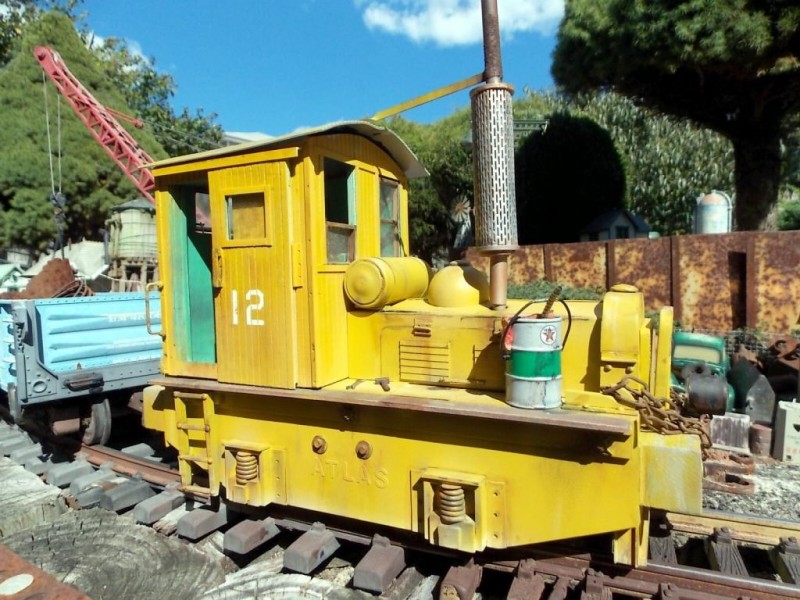
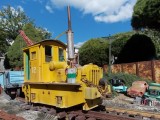
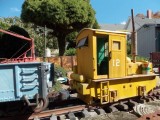
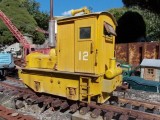
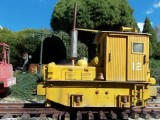
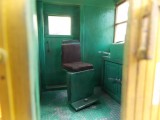
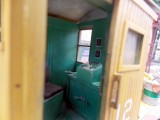
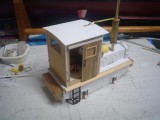
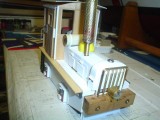
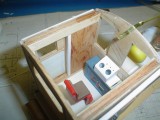
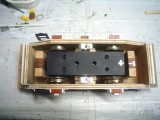
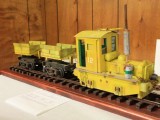
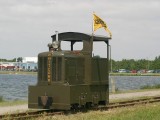
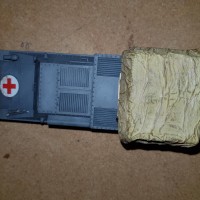
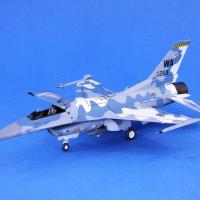
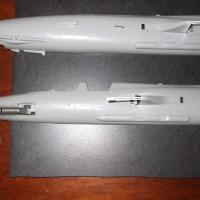

Huh...never seen one of them "critters" before. Outstanding build, I must say. Without having a definite reference to gauge the size (1/29th scale means nothing - at least to me), I'd venture to say that your model is approximately 12 to 14 inches in length, about 9 or 10 inches high and maybe 6-8 inches in width. Am I close?
Craig
The length of the loco is 9", 3" wide and 6" high. G scale model railroading is a bit confusing. The gauge of the track is 1.772 wide, the space from top of rail to other top of rail. What confuses people (and me) is that the gauge represents a narrow gauge railroad (3' wide) not the American standard gauge (4' 8 1/2" wide). But all types of scales (1.22.5, 1:29, 1:32) run on the same G scale track. I'm not picky about the scales I run on my layout, for example I run 1:29 but I have a few critters that are sort of 1:25 scale and a steam engine that is 1:22.5. Some train guys are "rivet counters" and would never mix the scales,i.e. building, vehicles, figures and rolling stock MUST be the same scale. Hope that helps...
Well, C**p...I wasn't close at all! It sure looks a lot bigger. Just goes to show ya what an exemplary modelin' job ya did, right? Right.
Guess one might as well type the word S**T, 'cause that milder one got bleeped anyway. 🙁
why would it take out the name of a fish
Mike,
I see another winner here. No matter how good the aircraft guys are, the railroad guys really know how to create a scene. Not only is the "Critter" excellent the surrounds are excellent.
A joy to behold.
Mike, I spent many years as a railway modeller in the UK, but gave it up when I moved to China. I tried most scales/gauges, but never quite made it to G Scale, although I did have some friends who ran this stuff in their gardens, and enjoyed having a few beers and watching the trains go round. You're right, G scale modellers are a little more liberal when it comes to accuracy, but all scales/gauges are something of a compromise anyway, whatever the rivet counters and armchair modellers say! I love your critter, excellent modelling and enjoyable at the same time.
Mike, I have spent ten minutes looking at your photo's and I still can't decide if the shots taken outdoors are the real thing or your build ,really amazing work.
N.
Beautiful! I really like it in all its yellow cuteness! There does seem to be lots of more interesting stuff if I look in the backgrounds of your photos...
Best regards
Magnus
And people think airplane modelers are strange! 🙂
Nice work. I have seen "critters" out at the railroad museum in Riverside County, and they are indeed interesting.